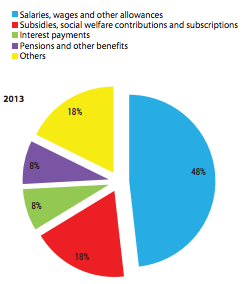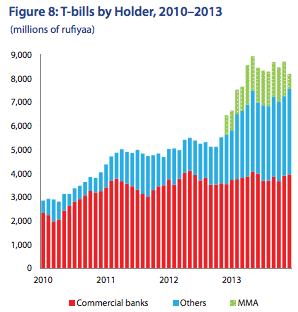Tourist arrivals in April increased 16 percent in annual terms, reaching 105,309 guests during the month, but declined marginally compared to March, according to the Maldives Monetary Authority’s (MMA) latest monthly economic review.
A total of 105,560 tourist arrivals were recorded during the previous month.
“The annual increase in arrival was contributed by the increase in the number of arrivals from Asia and Europe,” the review stated.
“In April 2014, total bednights rose by nine percent in annual terms while the average duration of stay declined by six percent. As for the occupancy rate, it increased to 80 percent in April 2014 from 75 percent in April 2013, as the impact of the increase in bednights was greater than the increase in operational bed capacity of the industry during the review month.”
The central bank had explained in its monthly review for March that the annual increase in tourist arrivals was due to the rise in the number of Chinese tourists, “which offset the decline in arrivals from Europe.”
According to statistics from the Tourism Ministry for the first quarter of 2014, Europe retained the largest market share despite the continuing growth of the Chinese market, accounting for of 51.3 percent of all arrivals to the Maldives.
 Asia and the Pacific recorded a growth rate of 24.4 percent at the end of first quarter, bringing in an additional 26,606 tourists to reach a total of 135,839.
Asia and the Pacific recorded a growth rate of 24.4 percent at the end of first quarter, bringing in an additional 26,606 tourists to reach a total of 135,839.
The region accounted for 42.2 percent of arrivals to the Maldives at the end of first quarter of 2014.
The Chinese market also expanded by 24 percent with an additional 16,960 tourists compared with the same period of 2013.
A total of 331,719 Chinese tourists visited the Maldives last year, which was a 44.5 percent increase from the previous year.
Chinese tourists accounted for 29.5 percent of all tourist arrivals in 2013.
The Maldivian economy is largely dependent on tourism, which accounted for 28 percent of GDP on average in the past five years, and generated 38 percent of government revenue in 2012.
Real GDP growth is meanwhile expected to accelerate to 4.5 percent in 2014, “driven mainly by the tourism sector” while “economic activity is also expected to be spurred by the government budgeted expenditure of MVR16.4 billion.”
Inflation
The rate of inflation in the capital Malé – measured by the annual percentage change in the Consumer Price Index (CPI) – reached 2.6 percent in April, up from 2.3 percent the previous month.
The inflation rate in February 2014 was 3.4 percent.
“This was largely contributed by the pick up in the growth of food prices, especially fish, and also due to the moderate growth in rent prices and cost of health services,” the review explained.
“On monthly terms, the rate of inflation increased from -0.5 percent in March 2014 to 0.3 percent in April 2014, which was mainly due to the growth in fish prices.”
“The monthly increase was mainly due to the increase in prices of petroleum, food and metal prices. As for the annual increase, it was due to the increase in food and petroleum prices as metal prices fell during the review period.”
“The price of crude oil increased by one percent in monthly terms and by six percent in annual terms to US$104.9 per barrel at the end of April 2014,” the review stated.
Gross international reserves meanwhile grew by 24 percent in April compared to the same period last year, reaching US$434.8 million by the end of the month. The gross reserves however declined by 13 percent in April in monthly terms.

